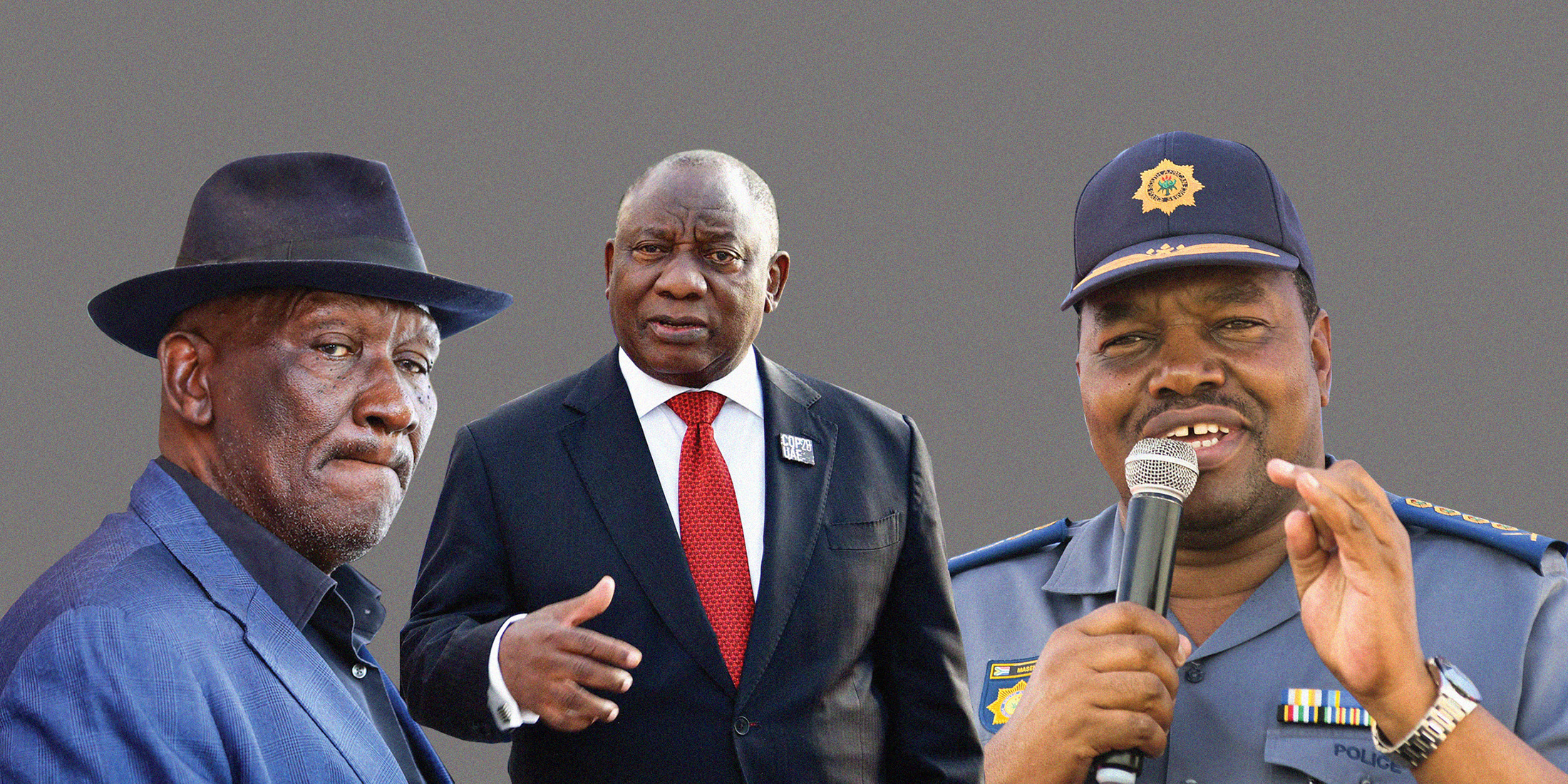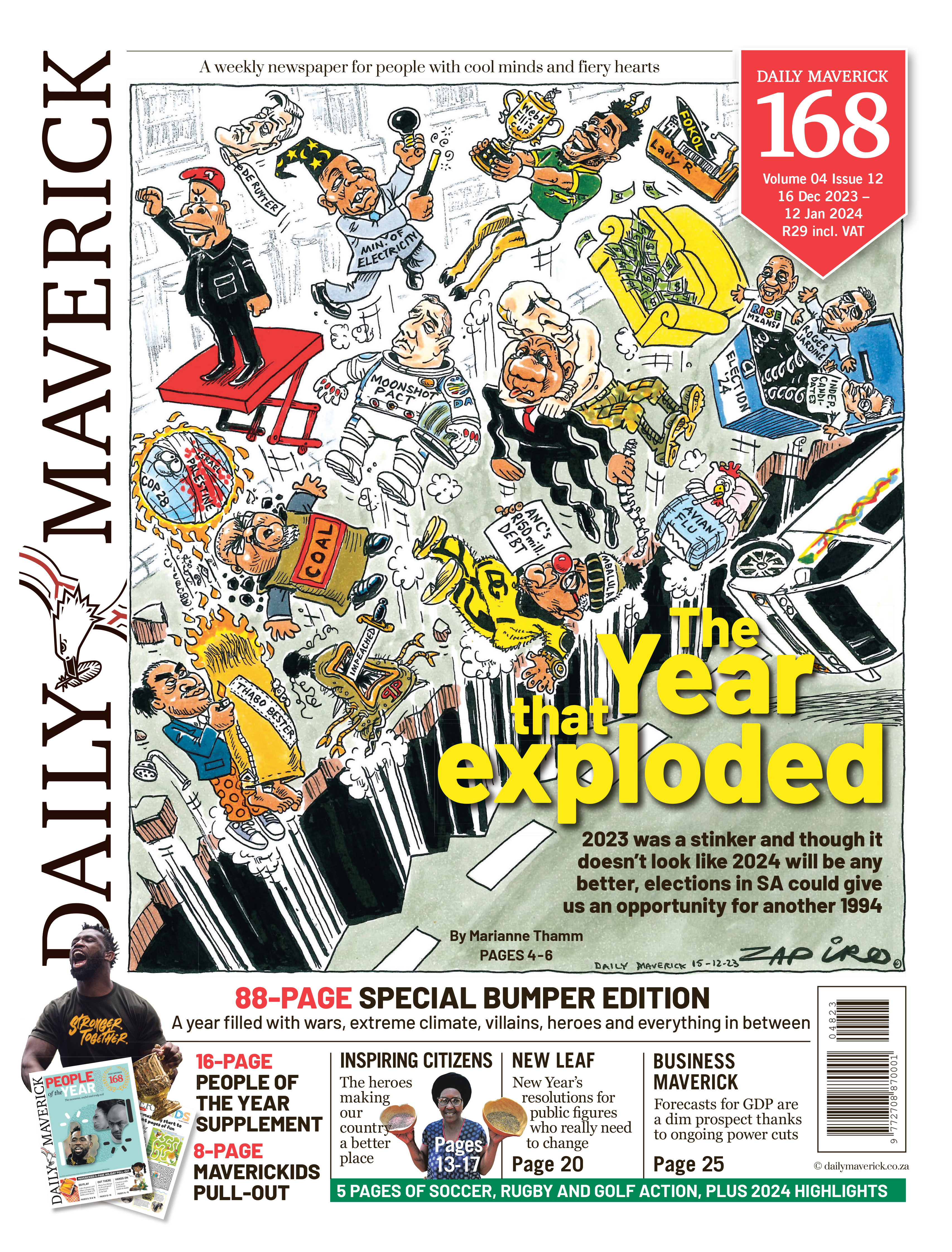Tugs-of-war in South Africa’s political circles will become more pronounced in 2024 because it is a critical election year.
And certain crime-fighting strategies, as well as developing court cases, are set to highlight the push against, and pull towards state corruption.
So, while politicians campaigning for votes reference how to tackle different types of criminality, more details may emerge about suspected, real or maliciously concocted corruption claims linked to figures in government offices, or those trying to occupy those spaces.
Politics and cash
Politics in 2024 will indeed cause more focus to be placed on leaders in law enforcement, including the likes of Police Minister Bheki Cele, who has faced heavy criticism in terms of policing failures, and whether they deserve to be in those positions.
This will happen as budget cuts and purse string-tightening continue affecting key organs of state, including the South African Police Service (SAPS) and National Prosecuting Authority.
The next year, therefore, poses a real crunch time, especially because the SAPS already has various understaffed divisions including its detectives, cybercrime component, the flying squad, K9 dog team and Anti-Gang Unit.
Read more in Daily Maverick: Specialist skills-deprived SAPS lumbers on to tick the boxes of performance targets amid downbeat perceptions
While dealing with those shortages, the SAPS has also been grappling with an array of lawlessness.
Crime versus capture
This includes countrywide murders with varying motives, kidnappings with targets ranging from business owners to students, and extortion, which has become a deadly problem stretching from railway tracks to construction sites.
Wildlife crimes — the poaching of animals and rare plants — also persist.
Different policing crackdowns were rolled out during the past year and, in an attempt to try to give cops an aerial vantage point in various operations, drones were used.
State acts that will bolster safety in the country are a necessary step towards security. However, while honest cops and law enforcement investigators are trying to do their work, crime is already embedded in and around the state itself.
In November 2023, it was reported that nearly 5,500 police officers had been charged for a variety of crimes since 2019.
Another situation pointing to embedded state crime was that the previous month President Cyril Ramaphosa extended the deployment of 880 South African National Defence Force (SANDF) members to Eskom power stations.
The soldiers, who bolster police work, are meant to protect power stations until at least March 2024 when Ramaphosa may request that they remain for a further period.
/file/dailymaverick/wp-content/uploads/2023/12/53373485677_b923a8f620_k.jpg)
Power stations and mines
The SANDF deployment is, in a sense, ironic because the Presidency previously said it was necessitated by “the growing threat of sabotage, theft, vandalism and corruption at Eskom power stations.”
Read more in Daily Maverick: Soldiers ordered to keep safeguarding Eskom power stations from saboteurs into 2024
This means, especially in terms of corruption in Eskom, that the state is deploying elements of the state to try and prevent state-facilitated crime.
Rolling blackouts, meanwhile, a byproduct of State Capture linked to Eskom, persist.
Criminals are also squeezing South Africa’s mining sector, and more resources to counter their grip are being channelled that way. President Ramaphosa, in November 2023, confirmed that 3,300 soldiers had been deployed for six months to try to curb — and prevent — illegal mining.
This is where crime branches out and hints at what law enforcement in South Africa is up against.
Ramaphosa said: “Illegal mining is linked to other crimes such as money laundering, bribery and corruption, illicit financial flows, human and weapons trafficking, and other forms of organised crime.”
Illicit gold mining and dealing in South Africa, for example, ties into transnational crime.
Daily Maverick has previously detailed how this country is a key transit point for gold smugglers wanting to channel the precious metal to and from Dubai.
Transnational drug trafficking
The Irish-origin Kinahan cartel, suspected of laundering income from illicit gold sales, some of it linked to this country, is believed to use that dirty money to conduct other crimes, like narco-trafficking.
This is another massive problem the SAPS is trying to deal with.
Throughout the year, several drug crackdowns in this country, as well as other states including Brazil and Australia, again emphasised how South Africa plays a pivotal role in transnational trafficking.
Read more in Daily Maverick: Australian cops ground suspected traffickers after cocaine worth R500m flown in from SA
As Daily Maverick has reported, internationally operating traffickers seem to favour the Port of Durban (where a backlog of containers is causing a major snarl-up) through which to operate.
Towards the end of 2023, two cocaine interceptions worth R150-million, linked to a vessel that arrived there from Brazil, were made. This shows that, even while some cops are suspected of being complicit in drug trafficking, police are trying to crack down on cartels.
Around the time of the R150-million cocaine interceptions, National Police Commissioner General Fannie Masemola warned: “Intelligence is at work, our members are on the ground throughout the country, clamping down on all forms of criminality.
“Day in, day out we continue to confiscate large quantities of these drugs; SA is not a playground for criminals.”
/file/dailymaverick/wp-content/uploads/2023/12/Caryn-State-contradictions-3.jpg)
Cross-country killings
However, Masemola’s words, when viewed in conjunction with the expanse of organised in the country, along with criminality in the state, including in the police service, come across as somewhat hollow.
Other incidents that played out in 2023 suggest some criminals do indeed view South Africa as “a playground” and SAPS officers will again have their hands full in 2024 trying to counter that image.
An example pointing to this country being an international criminal haven is the case of Krasimir Kamenov. Kamenov, his wife, Gergana, and two of their employees were fatally shot at a home in the upmarket Cape Town suburb of Constantia on 25 May.
The four were originally from Bulgaria.
Read more in Daily Maverick: Constantia killings — ‘oligarchs in SA’ plus other curious details linked to the Krasimir Kamenov case
The assassinations highlighted how elements of Bulgarian — and global — organised crime were at play in this country.
At the time of Kamenov’s killing, he was wanted by Bulgaria in connection with a threat, murder and extortion. His name also cropped up in Bulgarian political circles with accusations along the lines he was involved in State Capture-style plots.
By December, no arrests were made in connection with the assassinations.
Another murder that pointed to international organised crime links in South Africa was that of Shafiq Naser, originally from Israel. Gunmen on a motorbike ambushed while he was driving in the Cape Town suburb of Milnerton. Naser was involved in the construction, luxury vehicle and property industries in Cape Town.
A year earlier, his cousin Abdel Fattah Nassar, who had suspected links to organised crime in Israel, was shot dead after he fired a gun outside the Grand Africa Café & Beach in Cape Town’s Granger Bay.
Security had returned fire.
/file/dailymaverick/wp-content/uploads/2023/06/62702349-1.jpeg)
Gangsterism
In terms of other local crime with international offshoots, gangsterism remains a critical problem in various South African provinces.
This is not expected to change.
However, with the 2024 elections looming, more focus will probably be placed on the scourge.
The Western Cape is often the most volatile in terms of gangsterism in South Africa. During previous election periods, politicians have focused more on gang hotspots, probably in attempts to try and win over voters there.
With the ANC in charge of the SAPS, and the DA governing the City of Cape Town, residents where gangsterism is rife can get caught up between rival politicians making promises of how they can best tackle the criminality.
Read more in Daily Maverick: ’Tis the season to be vigilant as Cape Town crime world seethes
Politics could therefore be a driving factor behind more gang-related arrests. However, as Daily Maverick has previously reported, the detention of gangsters could spark more shootings as rivals try to fill resultant power vacuums.
There were some pivotal cases that already started developing in 2023 that could also see more suspects behind bars.
At the end of September, for example, 28s gang boss accused Ralph Stanfield and his wife Nicole Johnson were detained with three other suspects.
Read more in Daily Maverick: Net seems to be closing in on alleged 28s gang ‘boss’ Ralph Stanfield after his arrest in Constantia
They faced charges including fraud and car theft and, after being denied bail, they were expected back in the dock again in February 2024.
That case already has some political strands attached to it.
Complicity suspicions
In March 2023, Malusi Booi was fired from the post of mayoral committee member for human settlements after his City of Cape Town office was raided as part of a fraud and corruption investigation.
Daily Maverick reported that Stanfield’s name surfaced in that investigation into whether Booi had accepted cash gratifications from organised crime figures.
Booi was not criminally charged.
So far, in the Stanfield court case, the surname of a police officer was noted in an investigator’s affidavit, bringing into question whether the cop was working with suspects in that case.
Stanfield and Johnson, meanwhile, face criminal charges in another case stemming from 2014 and based on allegations police officers provided firearm licences to suspects who were not entitled to the paperwork.
Alleged fraud involving firearm licences is a major problem in the SAPS, as is the alleged smuggling of guns to criminals.
These issues, which extend across various provinces, will undoubtedly push on into 2024.
Major trials
There are several other more mature court cases that are set to further develop in 2024 that could expose aspects of lawbreaking in the state.
In the Western Cape, alleged organised crime kingpin Nafiz Modack, along with 14 other co-accused, is expected to go on trial for the September 2020 assassination of detective Charl Kinnear outside his Bishop Lavis home in Cape Town.
The trial may finally proceed in January.
Kinnear’s killing exposed infighting and distrust in the SAPS at a provincial and national level. The Independent Police Investigative Directorate previously found that several high-ranking cops did not do enough to act on threats against him and ensure he had state security in the run-up to his murder.
But, by late 2023, action was yet to be taken against those officers.
As for Modack, he has before accused other cops, some of them now no longer in service, of unfairly targeting him.
His trial may therefore expose more allegations of police corruption — and cop infighting.
/file/dailymaverick/wp-content/uploads/2023/12/Caryn-State-contradictions-4.jpg)
Faked death
Another major trial expected to start unfolding in 2024 is that of convicted murderer and rapist Thabo Bester, who escaped from the Mangaung Correctional Centre in May 2022.
He faked his own death and was only arrested in April 2023.
GroundUp reporters investigated and broke the story, and found that government figures were aware of what had happened but dragged their feet in dealing with the mess.
Read more in Daily Maverick: Damning timeline — Government knew of Thabo Bester escape as early as October 2022 but failed to act
Bester’s eight co-accused, including his alleged partner in crime Dr Nandipha Magudumana, are set to go on trial with him in February at the Free State Division of the High Court in Bloemfontein.
/file/dailymaverick/wp-content/uploads/2023/12/Rebecca-New-Year-resolution-6.jpg)
Cases heating up and cooling down
There are countless other crimes that rattled South Africa in 2023 that are yet to develop into court cases and trials.
In February, rapper Kiernan Forbes, also known as AKA, and his celebrity chef friend, Tebello “Tibz” Motsoane, were murdered outside a Durban restaurant.
They were shot in a brazen incident that was caught on camera, and footage of it spread on social media.
In September 2023, it was reported that police had made significant progress in the case, finding the firearm used in the murders, tracking cars used afterwards and identifying potential suspects.
If arrests are made, this will be a massive case that develops in 2024.
Meanwhile, State Capture investigations, some stemming from when Jacob Zuma was still South Africa’s president, could result in other arrests and court cases.
/file/dailymaverick/wp-content/uploads/2023/12/Caryn-State-contradictions-2.jpg)
In November, though, the R2.2-billion Kusile corruption case was struck off the roll of the Middelburg Regional Court due to unreasonable delays.
The development — or non-development — of State Capture matters in 2024 may hinge on how issues, including shifts in politics and budget constraints, further impact government institutions. DM
This story first appeared in our weekly Daily Maverick 168 newspaper, which is available countrywide for R29.





 Illustrative image: Minister of Police Bheki Cele. (Photo: Shelley Christians) | President Cyril Ramaphosa. (Photo: GCIS) | General Fannie Masemola, National Commissioner of the SAPS. (Photo: Gallo Images / Darren Stewart)
Illustrative image: Minister of Police Bheki Cele. (Photo: Shelley Christians) | President Cyril Ramaphosa. (Photo: GCIS) | General Fannie Masemola, National Commissioner of the SAPS. (Photo: Gallo Images / Darren Stewart) 